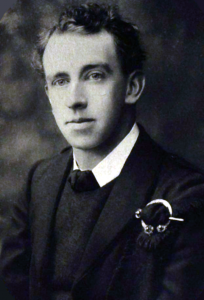Thomas MacDonagh (1878-1916) - Irish Poet, Playwright, and Easter Rising Leader
 Thomas MacDonagh was an Irish poet, playwright, and Easter Rising leader who fought for Irish independence. He was born on February 1, 1878, in Cloughjordan, County Tipperary, to Joseph and Mary MacDonagh. He had two brothers and a sister.
Thomas MacDonagh was an Irish poet, playwright, and Easter Rising leader who fought for Irish independence. He was born on February 1, 1878, in Cloughjordan, County Tipperary, to Joseph and Mary MacDonagh. He had two brothers and a sister.
MacDonagh was a talented writer and his work appeared in several publications, including the Irish Review and Sinn Féin. He was also a professor of English at University College Dublin, where he was known for his dedication to his students.
In 1912, MacDonagh married Muriel Gifford, and the couple had two children, a son and a daughter. After the Rising, Muriel worked tirelessly to secure her husband’s legacy and promote his work.
During the Easter Rising of 1916, MacDonagh was one of the seven signatories of the Proclamation of the Irish Republic and played a key role in the occupation of Jacob’s Biscuit Factory. He also fought alongside his fellow rebels in St. Stephen’s Green.
After the Rising was quashed, MacDonagh was court-martialed and sentenced to death. British soldiers who witnessed his execution commented on his bravery and dignity. He was executed by firing squad on May 3, 1916, at Kilmainham Gaol.
Thomas MacDonagh’s life and legacy as a poet, playwright, and Easter Rising leader continue to inspire generations of Irish people. His dedication to Irish culture and independence, and his commitment to education, remain an important part of Irish history.
MacDonagh’s work as a writer, including his plays and poetry, continues to be celebrated in Ireland and around the world. His contribution to Irish literature and culture is a reminder of the important role that the arts can play in the fight for social and political change.